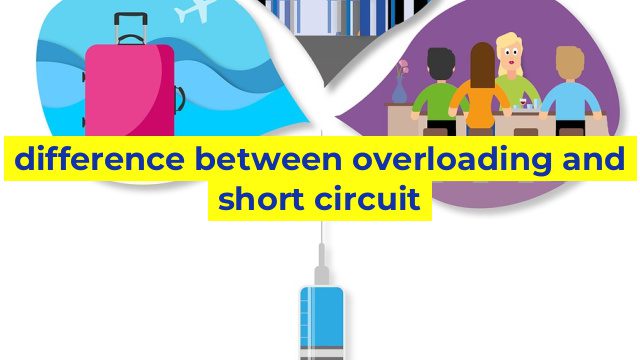Difference between Overloading and Short Circuit
Electricity is a basic need in our daily lives, and we use it to power various devices and equipment. However, electrical systems are not immune to faults, and two of the most common faults are overloading and short circuit. In this article, we will discuss the difference between overloading and short circuit.
What is Overloading?
Overloading occurs when an electrical circuit is overloaded with more current than it can handle. This happens when too many devices are connected to a single electrical outlet, or when an electrical device draws too much current. Overloading causes the electrical circuit to heat up, and over time, it can cause damage to the circuit and the equipment connected to it.
The most common sign of overloading is the tripping of circuit breakers or blowing of fuses. This happens when the circuit senses that too much current is flowing through it and shuts off to prevent damage. Overloading can also cause appliances to overheat or malfunction.
What is Short Circuit?
A short circuit occurs when two electrical conductors touch each other, causing a low resistance path for current to flow. This bypasses the normal load of the circuit, causing a sudden surge of electrical current. Short circuits are generally caused by damaged or faulty wiring, exposed wires, and damaged insulation.
The most common sign of a short circuit is a sudden loss of power, accompanied by a buzzing or humming noise. It can also cause electrical wiring to heat up or burn, resulting in a potential fire hazard.
Their Differences
Overloading and short circuit are two different faults that can occur in electrical systems. Overloading is caused by the excessive amount of current being drawn by a device or appliances connected to a single circuit. On the other hand, a short circuit is caused by two exposed electrical conductors coming into contact with each other.
The symptoms are also different for each fault. Overloading usually causes the tripping of circuit breakers or blowing of fuses, while short circuits result in a sudden loss of power.
Conclusion
In conclusion, both overloading and short circuit are faults that can occur in electrical systems. Overloading is caused by excessive current drawn on the circuit, while short circuits are caused by two electrical conductors touching. It is crucial to understand the difference between overloading and short circuit as they require different approaches to resolve. Consulting an electrician should be considered in case of any electrical faults to ensure the safety of your electrical systems and appliances.
Table difference between overloading and short circuit
| Overloading | Short Circuit |
|---|---|
| Allows a function to have the same name but different parameters and return types. | When a boolean expression can be determined without evaluating the entire expression, the rest of the expression is not evaluated. |
| Used to provide flexibility in the programming language by creating multiple versions of a function that perform different operations. | Used as a performance optimization to prevent unnecessary evaluations. |
| Requires explicit invocation of a specific overloaded function. | Automatically occurs when evaluating a boolean expression. |
